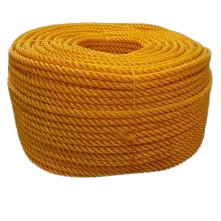Get A Quote
BIS Certification for Fibre Ropes-Polyethylene-3-And 4-Strand Ropes IS 8674 :2013

Fibre ropes made
from polyethylene are widely used in various industrial, marine, and commercial
applications due to their excellent durability, lightweight nature, and
resistance to chemicals and moisture. The production of polyethylene 3- and
4-strand ropes involves high-quality polymer materials that undergo extrusion,
twisting, and braiding processes to form strong, flexible ropes. These ropes
offer excellent load-bearing capacity, making them ideal for use in harsh
environments where reliability is critical.
Introduction
BIS certification for Fibre Ropes - Polyethylene - 3- and 4-Strand Ropes ensures that these products comply with the quality and safety standards set by the Bureau of Indian Standards (BIS). The Ministry of Textiles issued the "Ropes and Cordages (Quality Control) Order, 2024" on 3rd October, making BIS certification mandatory for all manufacturers producing and selling polyethylene ropes in the Indian market. The certification allows the use of the ISI Mark, signifying that the products meet Indian standards and are safe for commercial and industrial use.
Why is BIS Certification Necessary for Fibre Ropes - Polyethylene - 3- and 4-Strand Ropes?
BIS certification is crucial for manufacturers of Fibre Ropes - Polyethylene - 3- and 4-Strand Ropes as it ensures that their products meet national standards for quality and performance. Under the "Ropes and Cordages (Quality Control) Order, 2024," manufacturers must obtain BIS certification to legally sell these ropes in India. Non-compliance can lead to penalties, including imprisonment, fines, and product seizures. The certification process protects consumers by ensuring the ropes' durability, safety, and reliability, while also enabling manufacturers to compete in the market with certified products.
Overview of Indian Standard IS 8674:2013
Indian Standard
IS 8674:2013 specifies the material, construction, and performance requirements
for Fibre Ropes - Polyethylene - 3- and 4-Strand Ropes. This standard covers
critical parameters such as tensile strength, elongation, abrasion resistance,
and environmental performance to ensure that the ropes meet industrial demands.
Compliance with IS 8674:2013 is now mandatory under the "Ropes and
Cordages (Quality Control) Order, 2024," ensuring that only certified and
high-quality products can be sold in India with the ISI mark. Failure to comply
may result in severe consequences for manufacturers, including imprisonment,
fines, or both.
Process for BIS Certification
The BIS
certification process for Fibre Ropes - Polyethylene - 3- And 4-Strand Ropes
involves multiple steps, designed to thoroughly evaluate a product's compliance
with the required standards. Here is a general overview of the certification
process:
1. Application Submission: Manufacturers
must submit an application form along with required documentation to BIS.
2. Documentation Review: BIS reviews the
submitted documents to ensure completeness and correctness.
3. Factory Inspection: BIS officials
conduct an on-site inspection of the manufacturing facility to assess the
production process and quality control measures.
4. Sample Testing: Product samples are
taken and tested in BIS-approved laboratories to verify compliance with Indian
standards.
5. Certification Grant: Upon successful
completion of the inspection and testing, BIS grants certification, allowing
the manufacturer to use the BIS mark on their products.
Documents Required for BIS Certification
To apply for BIS certification, manufacturers need to submit the following documents:
● Application form
● Manufacturing process details
● Quality control plan
● Test reports from BIS-approved laboratories
● Factory layout and equipment details
● Proof of business registration
● Product specifications and technical details
● Declaration of conformity to Indian standards
Additionally, manufacturers may be required to provide proof of compliance with environmental and safety regulations, depending on the specific type of product being certified.
BIS ISI Mark Certification Costing And Timeline
To Know The Process in Detail, Please Visit:
Under BIS Registration Products ISI and CRS
Conclusion
In conclusion, BIS certification for
Fibre Ropes - Polyethylene - 3- and 4-Strand Ropes is essential for ensuring
product quality, safety, and compliance with Indian standards. Mandatory under
the 2024 Ropes and Cordages QCO, this certification allows manufacturers to
legally market their products, ensuring reliability and protection for
consumers and industries alike.
Navigating the BIS certification
process can be challenging, especially for small and medium-sized enterprises.
EVTL India is a leading consultancy firm dedicated to assisting manufacturers
in obtaining BIS certification (ISI Mark) efficiently. With expertise in
managing BIS portal submissions, documentation, and regulatory fees, EVTL India
ensures a smooth and successful certification process. By choosing EVTL India,
manufacturers can enhance their product's marketability both in India and
internationally, securing a competitive edge. Additionally, EVTL India provides
ongoing support post-certification, helping manufacturers maintain compliance
with BIS standards and renew their licenses as needed.
Free Call Back
Latest News & Update
📅 BIS Critical Component List (CCL) Updates for Solar PV Modules
🕒 BIS Fee Concessions for MSMEs and Startups | EVTL India
📅 Guidelines for Implementation of Essential Requirements for Security of CCTV
🕒 Omnibus Technical Regulation (OTR) Amendment Order, 2025
🕒 Extension of Timeline for Filing Annual Returns by Battery Producers
📅 Extension of Timeline for Filing Quarterly and Annual Returns for E-Waste
🕒 Extension of Concurrent Running Period for IS 302-1: 2008 and IS 302 (Part 1): 2024
🕒 BIS Guidelines for Grant of Licence (GoL) | EVTL India
📅 CPCB Guidance on filing of Application, Fees and more
🕒 CPCB Notification on Labelling of Plastic Packaging
📅 Mandatory Compliance for Input Materials of Steel and Steel Products for Imports
🕒 BIS Guidelines for Scheme-X Certification for OTR-Regulated Products
📅 BIS Upgrades Product Certification License Numbers to 10-Digit Series
🕒 BIS Certification No Longer Mandatory for 14 Chemical & Polymer Categories
Why Choose EVTL INDIA
Expertise in Indian Regulatory Standards
End-to-End Support
Trusted by Top Indian & Global Brands
Fast Processing & Transparent Pricing
Strong Liaison with Indian Authorities
Company Profile














